Sinclair and UD approved their plans this week.
“Sinclair prioritizes the safety and health of every member of our campus community,” Steve Johnson, the college president, said in a statement. “While we are learning that we’ve made progress as a state in controlling COVID-19 infections, we will continue to operate with the utmost caution, following guidance from our state and public health officials.”
UD has a plan that President Eric J. Spina said he is optimistic about, although it will require everyone to be flexible.
“The state of the disease will continue to change, so even something we published today, I can’t promise it’s not going to change in a week or six weeks or eight weeks,” he said. “But based upon our conversations with public health officials and our medical panel, we believe the set of expectations and protocols that we’re setting will enable us to live in community, to learn in community. If we work together, we do believe that we can do this successfully.”
Related: Sinclair board approves $130M budget
Sinclair will use new cleaning, safety and health measures to mitigate the spread of infection at the college. Plexiglas and other barriers have been installed in high traffic public areas such as cash registers and reception desks in Sinclair’s Dayton campus as well as regional centers located in Englewood, Huber Heights, Centerville and Mason, school officials said. They’ve also installed signs throughout the campuses, reminding people to adhere to proper health protocols.
Sinclair employees will begin increasing in-person work on July 6 on Sinclair campuses in a careful and phased approach. They will continue to practice social distancing, said Adam Murka, vice president of advancement.
Related: Coronavirus: Complete coverage
Feedback from students and employees was they were in favor of a mask requirement, he said.
Hand sanitizer will also be available, and the college will provide masks for people who don’t have them when they’re on campus, Murka said. For those who either don’t want to wear a mask or can’t because of health reasons, the college will come up with alternative accommodations, including allowing those individuals to do their work virtually. Seventy percent of the classes will be offered online, he said.
“So we will communicate expectations ahead of time, and it is our hope that we can continue to provide the safe and welcoming learning environment that everybody is used to,” Murka said.
Prior to the coronavirus pandemic, about 30 percent of Sinclair’s courses were online, and some 10,000 students were enrolled in them. However, as part of the reopening plan that the board approved, 70 percent of instructions will be held online, as there are some courses that require face-to-face instructions.
Related: Bachelor’s degrees now available at Sinclair Community College
University of Dayton
UD developed its reopening plan after getting input from about 100 members of the campus community, and the measures align with recommendations from federal, state and local health agencies.
Fall move-in will be a phased process beginning Aug. 8 and ending on Aug. 23. When classes begin on Aug. 24, certain students who live in UD housing as well as those who recently returned to the United States from other countries will be required to be tested for COVID. The university will release details of that plan next week, Spina said. If students do test positive, they will be placed in isolation housing where they can get the appropriate medical care and food.
Classes will be held in a variety of ways. Some will be face-to-face, but nearly all will also be available virtually as well, the school announced. Some classes will be entirely online.
For students who attend Catholic services at the school will be limited number of people allowed during mass. Campus chapels, prayer rooms and multifaith space for personal prayer, reflection or meditation will be available, but people must practice social distancing and wear masks, officials said.
Related: UD adjusts operations in response to the coronavirus pandemic
In an effort to discourage nonessential travel during the semester, students will be dismissed from campus for the Thanksgiving holiday and complete the rest of the semester online.
“I think it’s important for people to know that even with the changes, even with wearing a mask or physically distancing, it’s still the University of Dayton,” Spina said. “People are committed to each other, there will be lots of opportunities for students to have really meaningful experiences. Even though it’s different, it’s still going to be the University of Dayton, the faculty and staff are still deeply committed to the student.”
About the Author
